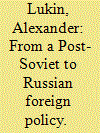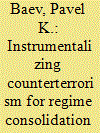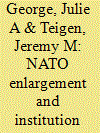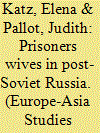| Srl | Item |
| 1 |
ID:
083916


|
|
|
| 2 |
ID:
052397


|
|
|
|
|
| Publication |
Jul-Aug 2004.
|
| Summary/Abstract |
Since the late 1990s, Russia has been among the countries most painfully affected by terrorism and President Putin has shown little doubt and even much enthusiasm in joining the U.S.-led "war" against terrorism. Intertwined as they are, counterterrorism and Chechnya are still significantly different matters in Russian security policy, and this article aims at examining how the struggle against terrorism shapes essential features of Russia's foreign and domestic policies during Putin's first presidency. Internally, the struggle against terrorism provides for a sufficient mobilization of the dysfunctional society around the "mutant" regime that has consolidated its control over mid-term political agenda. Internationally, high-profile counterterrorism strategy has helped Russia to secure for itself a more prominent role than the sheer size of its "assets" would justify. This war is fundamentally not about victory; it is about many "collateral" benefits for the regime that Putin is presiding over.
|
|
|
|
|
|
|
|
|
|
|
|
|
|
|
|
| 3 |
ID:
116004


|
|
|
|
|
| Publication |
2012.
|
| Summary/Abstract |
This essay presents a micro-level analysis of ethnic identity construction among ethnic Germans resident in Ul'yanovsk. The essay explores the local and trans-local situation of this group within a historical framework which informs the group's understanding of how to 'be German'. It shows respondents' participation in 'return'-based, family-orientated diaspora networks. Analysis of the divergent discourses that emerge around the theme and experiences of mutual visits and travel to the Federal Republic of Germany and the differing identity outcomes which result are discussed. This reveals the ways in which transnational links can be utilised by non-movers both to problematise and to augment their local identities. This, in turn, uncovers the continuing relevance of issues around post-Soviet 'returns' for contemporary identity-construction and highlights the potential for analysis of non-movers as participants in migration networks.
|
|
|
|
|
|
|
|
|
|
|
|
|
|
|
|
| 4 |
ID:
085672


|
|
|
|
|
| Publication |
2008.
|
| Summary/Abstract |
States' conscription policies reveal much about their security climate, economic constraints, political debates, and social norms. While conscription has waned among democratic countries, several states maintain it as a way to socialize and educate their citizens. As post-communist states embrace Western influence and NATO, many have ended compulsory military service. In post-Soviet Georgia, however, conscription policy is a microcosm illustrating the difficulties of bridging security vulnerabilities, political upheaval, and resource realities. Although previous scholarship predicts that security and economic needs should supersede other considerations, we find that the domestic political context looms larger for decision makers of transitioning states
|
|
|
|
|
|
|
|
|
|
|
|
|
|
|
|
| 5 |
ID:
128247


|
|
|
|
|
| Publication |
2014.
|
| Summary/Abstract |
The identity of a prisoner's wife is often a shameful societal stigma. Yet Russia's unique history of imprisonment has provided an unusually positive trope for women who have to come to terms with their partners' incarceration: the 'Decembrist wife' (dekabristka). This trope originated in the aftermath of the 1825 'Decembrist' uprising-the first anti-monarchist revolt in modern Russian history. A handful of wives of the perpetrators voluntarily joined their husbands in Siberian exile and, in leaving behind families and comforts, created a precedent to be glorified for future generations. Upheld in Russian national mythology as a model of the exemplary wife, the dekabristka identity lives on. This paper examines its enduring power and significance in contemporary Russia
|
|
|
|
|
|
|
|
|
|
|
|
|
|
|
|